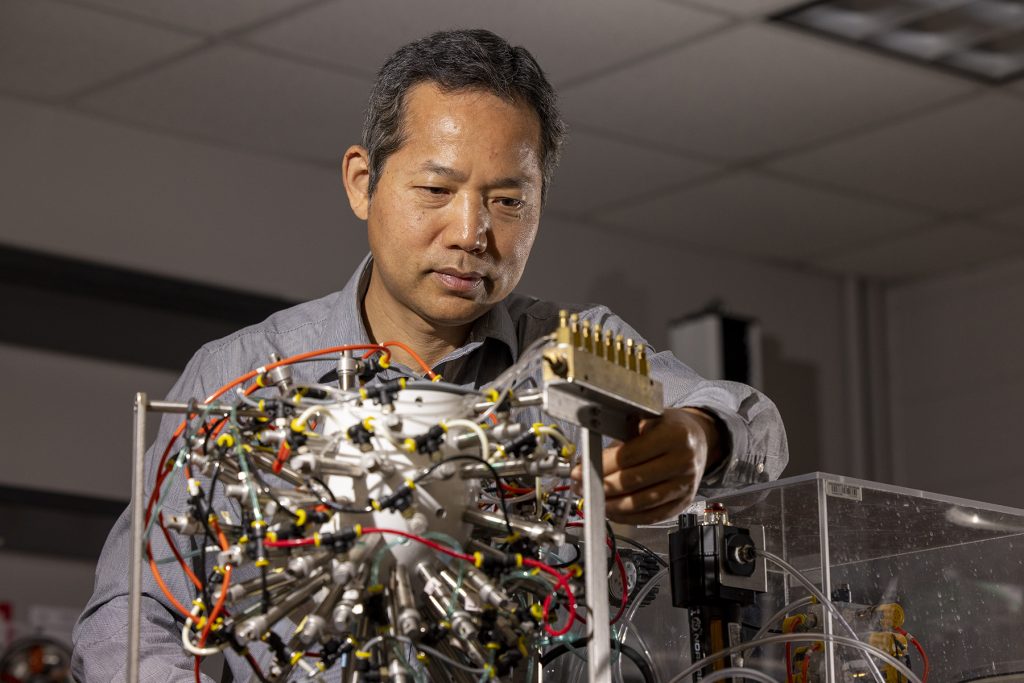Food engineering professor Fanbin Kong has dedicated his life to studying how our bodies process the food we eat. Through his current research, Kong is gaining insights into how some nonfood materials may assist in weight loss.
Kong studied environmental engineering early in his academic career, earning his bachelor’s degree from Tianjin University and master’s degree from Tsinghua University, both in his native China. Kong’s work in Tianjin and Beijing focused on wastewater treatment, including a project designed to recover nutrients from soybean-processing wastewater through filtration.
His work on soybean processing wastewater and its composition prompted Kong to move to the U.S. to pursue a second master’s degree in food science at North Dakota State University and later to earn his doctorate in food engineering at Washington State University.
“Moving to the United States and changing my focus of study and research has been one of the best decisions of my life,” Kong said. “Before coming to the United States, my research was mainly in wastewater treatment and membrane filtration technology. This experience is actually very useful for my future research on food, because many similar technologies are also used in food processing.”
After completing his doctoral degree, Kong moved on to complete his postdoctoral research at the University of California, Davis, where he first focused on digestive studies and had the opportunity to build an artificial stomach model. Kong has continued this research direction at the University of Georgia and has received nearly $2 million in funded research to investigate human digestion as well as new food processing technologies.
After Kong accepted an assistant professorship in UGA’s College of Agricultural and Environmental Sciences in 2011, his experience building an artificial stomach model led him to develop several new functional stomach and intestinal models that are integral to his research.
“With the support of two U.S. Department of Agriculture grants, my team has used these models to study how nanocellulose, a novel nanomaterial produced from wood pulp, transforms in the human gastrointestinal tract and impacts food digestion,” Kong said.
Early results suggest that some nanocellulose can create a gel-like substance in the stomach that slows the digestion of other foods, making people feel fuller for longer.
The second phase of this research, which involves studies into the toxicity of nanocellulose as a food additive, is still ongoing. Kong is collaborating with Tai Guo, a faculty member at the UGA’s College of Veterinary Medicine, and Alexander Stelzleni in the Department of Animal and Dairy Science in the College of Agricultural and Environmental Sciences to carry out these studies.
Kong teaches several courses, including “Food Processing I,” “Experiential Senior Project in Food Science,” “Advanced Food Processes” and a First Year Odyssey seminar called “Chinese Tea Culture.” To improve student learning, he applies innovative teaching methods like the “flipped classroom” model, in which students learn principles and mathematical basics at home by watching online videos, optimizing class time for interactive learning in problem-solving and applying principles.
“The practice of this method actually helped a lot last year when online learning became an essential part of the class due to COVID-19 measures,” Kong said.
He’s also introduced the practice of meditation during class time, guiding students to practice focusing on their breath for five minutes at a time. Students in his “Chinese Tea Culture” seminar reacted positively to classroom meditation, and Kong plans to introduce the practice into his other courses.
Kong has been formally recognized for both research and instruction. He earned the NACTA Teaching Award of Merit in 2014 and was awarded the Distinguished Service Award from the Chinese American Food Society in 2017.
